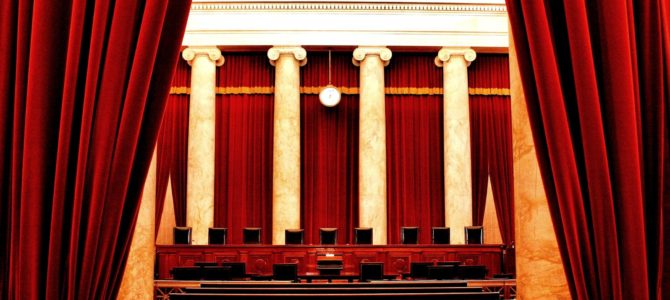
Interested to know what the top liberal legal minds of the United States Supreme Court think about government power and your private property? First, take 10 minutes to read Justice Brett Kavanaugh’s opinion, written for the majority, in the court’s Thursday night decision to stop the ban on rental income; then spend another 10 minutes on Justice Stephen Breyer’s dissent.
Here’s a hint: The left thinks its power is so overarching as to impact nearly every citizen, so broadly interpreted as to be essentially limitless, and so singularly vested as to be checked virtually solely at the discretion of the bureaucracy itself.
“Substantially … Tailored”
The absurdity begins in the opening paragraph of Breyer’s dissent, which was joined by Justices Elena Kagan and Sonya Sotomayor. There, he lauds what he describes as the government’s limited and judicious use of its power, writing, “the [Centers for Disease Control]’s current order is substantially more tailored than its prior eviction moratorium, which automatically applied nationwide.”
Therefore, he reasons, there’s no reason to even consider if the CDC has any authority on the matter.
How tailored is it, though? He gets to that two paragraphs later, when he cites the number of American counties the order applies to: Ninety percent; the vast majority of the country. This, he openly admits, is the left’s idea of “substantially more tailored;” it’s right there in the open.
Limitless Authority
So where does this “tailored” power come from, exactly? According to the CDC, it comes from the Public Health Service Act, a law Congress passed in 1944 to handle outbreaks of serious disease. It reads:
The Surgeon General may provide for such inspection, fumigation, disinfection, sanitation, pest extermination, destruction of animals or articles found to be so infected or contaminated as to be sources of dangerous infection to human beings, and other measures, as in his judgment may be necessary.
What’s that got to do with banning property owners from doing business with renters? To forbid them from ejecting squatters from their land? As written, not much at all: Every one of these powers is specific to, as Kavanaugh writes, “identifying, isolating, and destroying the disease itself.”
But according to Breyer, the Public Health Act essentially says “we can kill your dog in a plague, so we also have the power to say you don’t have to work during COVID” — a broad interpretation of congressionally authorized power at best.
How does he get there? Simple: the part of the law that grants the surgeon general the power to enact “other measures, as in his judgment might be necessary.”
Or, by not specifically naming every single means of identifying, isolating, and destroying COVID, Congress gave the CDC limitless authority to do as it pleases. “If Congress,” Breyer assures us, “had meant to exclude these types of measures from its broad grant of authority, it likely would have said so.”
Compare that reasoning with Kavanaugh’s, who maintains the court expects “Congress to speak clearly when authorizing an agency to exercise powers.”
The latter is the kind of reading that fits more soundly with, say, the 10th Amendment. written by men who had seen abuse of power, and hoped to curtail it. “The powers not delegated to the United States by the Constitution,” it reads, “nor prohibited by it to the States, are reserved to the States respectively, or to the people.”
In fact, this is clear in recent Supreme Court precedent. “Our precedents,” the court wrote in 2020, “require Congress to enact exceedingly clear language if it wishes to significantly alter the balance between federal and state power and the power of the Government over private property.”
A tenant’s relationship with his landlord falls under state law completely; that’s the reason, for example, you don’t hear about government rent-control outside of a number of cities in New York, Maryland, New Jersey, or California.
Bureaucracy über Alles
Congress, of course, could change this, as the 2020 decision notes, and for a while they did: that’s where the ban on moratorium came from in the first place.
So what happened? The congressional moratorium expired on Dec. 31.
But couldn’t Congress just extend it if they wanted to? Yes, and under Biden they did, adding one more month in the second COVID stimulus; and then they declined to extend it further.
So why is still going on? Because the CDC decided it didn’t need Congress anyway, extending the moratorium on its own apparent authority through March, then through June, then through July, and all the way to Thursday night, when Kavanaugh joined Justices John Roberts, Neil Gorsuch, Clarence Thomas, Samuel Alito and Amy Coney Barrett in putting a stop to it.
That decision down didn’t come quickly, either. In June, Kavanaugh joined the other side, staying the court’s hand in order to, he reasoned, allow long-appropriated government funds to go toward relief. That’s all the time it would need, the CDC insisted; but they lied, and here we are.
None of that matters, Breyer claims, because this is an emergency, and by going to work, people put themselves at risk of dying. Nevermind that nurses, grocery clerks, flight attendants, bartenders, police officers, construction workers, cab drivers, soldiers, cooks, trash collectors, cameramen, janitors, plumbers, warehouse employees, bouncers, pilots, firemen, musicians, engineers, and a whole host of others have long been back at work. Nevermind that the United States economy needs workers so badly some businesses are going under for lack of them. Just look at the charts!
In dissent, Justice Breyer includes a chart showing the rising number of COVID cases due to the delta variant. He warns that, with the moratorium lifted, the nation may see a wave of mass evictions with severe public-health consequences. pic.twitter.com/kmHfJ73QUA
— SCOTUSblog (@SCOTUSblog) August 27, 2021
Breyer is so convinced of this, he openly admits that backlogged government funds and renters refusing to pay rent is an “injury,” but claims the court has to “compare that injury with the irreparable harm of” eviction.
What irreparable harm, exactly? Only the chart is offered. Breyer completely neglects to even try to explain how evictions are more dangerous than the masses of Americans freely moving out of New York, California, Oregon, D.C., and other COVID-obsessed areas, or going about their day to day business, but in his thinking, he doesn’t need to: The CDC is not to be questioned on law or constitutional authority by any court in this land.
“The public interest,” he writes, “is not favored by the spread of disease or a court’s second-guessing of the CDC’s judgment.”
Fortunately, his colleagues in the majority disagree: “It is indisputable,” Kavanaugh writes in his conclusion, “that the public has a strong interest in combating the spread of the COVID–19 Delta variant. But our system does not permit agencies to act unlawfully even in pursuit of desirable ends.”
“It is up to Congress, not the CDC, to decide whether the public interest merits further action here.”
And that’s where the split is: Breyer and his political allies on the left and throughout the Democrat Party have unfailing faith in the technocracy; it’s near-religious, and we’re all living in it.
For the past 18 months, we’ve suffered under the thumb of this sort of unchecked bureaucracy: Closed schools, masked children, shuttered businesses, canceled weddings, restricted hospitals, forbidden funerals — even the public drug dens and homeless camps now filling major cities are products of CDC “guidance.” For “public health and safety,” we’re told.
But while it’s been in full public view these past 18 months, the reality is we have increasingly suffered under the thumb of unchecked bureaucracy since President Woodrow Wilson; its power and influence growing stronger each year, while the executive and congressional power and will to curb it have lessened.
Some of that growth is natural: influence craves influence, power craves power. But much of it is the result either of active policies in favor of it (or a failure to enact policies restricting it), driven by men like Wilson and men like Breyer — highly educated and seriously intelligent men who think that we, the people, ought not rule ourselves; the experts will take care of that.









